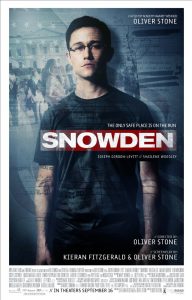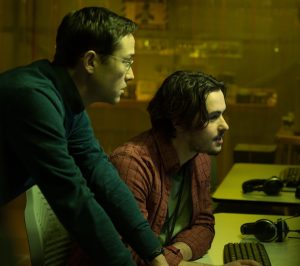 In Snowden, writer-director Oliver Stone offers a riveting personal look at one of the most polarizing figures of the 21st century, the man responsible for the most far-reaching security breach in U.S. intelligence history.
In Snowden, writer-director Oliver Stone offers a riveting personal look at one of the most polarizing figures of the 21st century, the man responsible for the most far-reaching security breach in U.S. intelligence history.
In 2013, Edward Snowden (Joseph Gordon-Levitt) quietly leaves his job at the NSA and flies to Hong Kong to meet with journalists Glenn Greenwald (Zachary Quinto) and Ewen MacAskill (Tom Wilkinson), and filmmaker Laura Poitras (Melissa Leo) to reveal U.S. government cyber surveillance programs of epic proportions.
A top security contractor with virtuoso programming skills, Ed has discovered that a lot of data is being assembled tracking all forms of digital communication — not just from foreign governments and terror groups, but from ordinary Americans.
Disillusioned with his work in the intelligence community, Snowden meticulously gathers hundreds of thousands of secret documents that expose the abuses. Leaving his longtime love Lindsay Mills (Shailene Woodley) behind, Ed finds the courage to act on his principles. Snowden opens the door on the untold story of Edward Snowden, examining the forces that turned a conservative young patriot eager to serve his country into a historic whistleblower and posing provocative questions about which liberties we are willing to give up in order for our government to protect u
In acclaimed films as diverse as Platoon, JFK, Natural Born Killers and Wall Street, Oliver Stone has mapped pivotal moments in American culture. From the War in Vietnam to the tragedy of 9-11, he has tackled controversial subjects in movies that are both intensely personal and utterly universal.
Tailor made for Stone’s unflinching eye
 The story of Edward Snowden was tailor made for Stone’s unflinching eye and knack for exposing hypocrisy in high places. Until he made his earthshaking revelations, Edward Snowden was by all accounts committed to supporting the American government. After growing up in a family steeped in government service, he enlisted in the military, aiming for the elite Special Forces and combat in the Iraq War. A catastrophic training accident put him out of the running and Snowden turned instead to a career in the CIA, and later the NSA.
The story of Edward Snowden was tailor made for Stone’s unflinching eye and knack for exposing hypocrisy in high places. Until he made his earthshaking revelations, Edward Snowden was by all accounts committed to supporting the American government. After growing up in a family steeped in government service, he enlisted in the military, aiming for the elite Special Forces and combat in the Iraq War. A catastrophic training accident put him out of the running and Snowden turned instead to a career in the CIA, and later the NSA.
Stone wondered what he could add to the public record that had not previously been revealed. There were already numerous newspaper articles, an Academy Award-winning documentary chronicling Snowden’s Hong Kong stay, and one book by The Guardian’s Luke Harding which the production purchased an option to.
“We wanted to explore where Snowden had come from, what he was doing inside the agencies he worked for, and what made him the one to go public. How did he do it? Did he recognize the cost before he did it?” Stone says.
Stone’s long-time producer Moritz Borman had been approached by Anatoly Kucherena, Edward Snowden’s Russian attorney. Kucherena had written a fictionalized account of the story and wanted to meet with Stone to talk about turning his novel into a feature film. Stone flew to Moscow, where after meeting with Kucherena, he ended up meeting with Snowden himself. “We weren’t sure at first whether we were going with a fictional version of his life or not,” Stone explains. “We were still looking for the structure. By talking to him and learning a little bit more, we began to see a pattern and a way of doing this.” The filmmakers decided to option both Kucherena’s book and The Snowden Files, Guardian correspondent Luke Harding’s inside look at the newspaper’s experience publishing Snowden’s revelations.
Stone set to work on the screenplay with Kieran Fitzgerald, the young writer of Tommy Lee Jones’ film The Homesman, who had previously collaborated with Stone on an adaptation of the Stuart Cohen novel, The Army of the Republic. For Fitzgerald, working with Stone had been a memorable and priceless experience: “Oliver’s one of the most sincerely passionate people I know,” he says. “It’s sad that there are not more Oliver Stones willing to stir the pot. In an age of apathy, I feel privileged to have worked with him.”
Fitzgerald was in Berlin working on an HBO pilot about the world of hacktivism. He was already meeting with documentarian Laura Poitras, journalist Jacob Appelbaum and others who had helped Snowden. “It was a very propitious moment,” the screenwriter says. “I felt that this was possibly the most important story I was ever going to write, so I said yes immediately. A week later I was in Moscow sitting down with Edward Snowden.”
Dramatic Thriller, Not Legal Tract
Perhaps not surprisingly, Snowden was initially wary of the filmmakers. “He wasn’t looking for a movie deal,” says Stone. “It was a long, drawn-out process. I went back twice more over three months and met again with Snowden before we decided to go ahead with as factual an account as possible. It was tense because Glenn Greenwald, whom we much admire, had also written a book, but it was more a legal tract. We were interested in a dramatic thriller.” Stone and Fitzgerald consulted technical experts and advisors as well as famous NSA whistleblowers like William Binney and Thomas Drake. “It was very important to Oliver and me that we not oversimplify Snowden’s words,” Fitzgerald says. “We wanted the audience to believe in the conversations between Ed and his colleagues and superiors.”
 For Fitzgerald, the heart of Snowden’s story is his transformation from dutiful son following his family’s military tradition to a man who committed what some have called the greatest act of treason in U.S. history. What compelled him to abandon his hard-won career and put himself at odds with the institutions he swore to protect? Fitzgerald says, “We all know what he did. The question was how and why?” Stone and Fitzgerald came to believe that Snowden’s relationship with longtime girlfriend Lindsay Mills was the key to understanding the mystery man at the center of the controversy. “You have to understand this core relationship to really understand Ed,” Stone says, “The press overlooked how much she matters to him. She keeps him human.”
For Fitzgerald, the heart of Snowden’s story is his transformation from dutiful son following his family’s military tradition to a man who committed what some have called the greatest act of treason in U.S. history. What compelled him to abandon his hard-won career and put himself at odds with the institutions he swore to protect? Fitzgerald says, “We all know what he did. The question was how and why?” Stone and Fitzgerald came to believe that Snowden’s relationship with longtime girlfriend Lindsay Mills was the key to understanding the mystery man at the center of the controversy. “You have to understand this core relationship to really understand Ed,” Stone says, “The press overlooked how much she matters to him. She keeps him human.”
Fitzgerald agrees: “She was the person he confided in more than anyone. And she was there during the 10-year period in which his transformation took place.” Complicating matters was the fact that this was an ongoing, high profile news story. “This was fresh news about a real person,” says Stone. “There was all this controversy, with some people saying he should be hanged, while others wanted to give him a Nobel Prize. I was after a story that would reflect the reality of the present situation. We decided the parallel core of the film to the ten-year journey was the tense six days inside the Hong Kong hotel room, where Ed met with Laura Poitras, Glenn Greenwald and Ewan MacAskill during June of 2013. We could have spent the whole picture just telling that part of the story. We divided Hong Kong into six scenes, building to the release of the information.” No one in that hotel room was ever sure whether the CIA / NSA / FBI would come bursting through the door or not, making the sessions harrowing. “So much was at stake,” Stone says. “They were in jeopardy from the get-go. Ed didn’t know if the NSA had a clue that he had left his post. There was continuous tension. We wanted not to overdo it though, because we had a much bigger story to tell.”
When they had a draft they liked, Stone and Fitzgerald returned to Russia to consult with Snowden. But the process of writing and rewriting, as with Stone’s films, continued through both the shooting and editing. The story centers on the personal and political evolution of Edward Snowden, according to Stone. “There is a resemblance to Born on the Fourth of July, which was about Ron Kovic, a kid from Long Island who believed in the Vietnam War and went there to fight. Seriously paralyzed from the chest down, he gradually turned protester against the war. He was eventually lauded as a hero at the Democratic Convention in 1976, and wrote a respected and poetic autobiography. I don’t know if there will be a similar outcome for Snowden. He’s in much more difficult terrain because of the Espionage Act and the seriousness of the charges brought against him.” The film moves back from the hotel room to key moments in the previous ten years of Snowden’s life, starting with a disastrous training accident. “He wanted to be Special Forces, but he broke both his legs,” the filmmaker says. “Then he joined the CIA and started to move upwards. He was a patriot who completely believed in the Iraq War. He, like many Americans at that time, believed we were doing the right thing.”
Dramatic License
 The writers acknowledge they have taken some dramatic license with events in the story, both for artistic and ethical reasons, but they feel they have stayed true to the spirit of Snowden’s journey. “There are charges against him,” Stone explains. “There are things that have to remain off limits. I think the solution will be that one day Ed will write a book.” Asked how he ultimately feels about Edward Snowden, Kieran Fitzgerald says the country is very lucky that it was Snowden who leaked the documents. “He takes the duties of an American citizen seriously and he asks everyone else to take their civic duty seriously.” The production returned to Moscow to complete shooting with a final scene that will have people talking about it long after the film is over. “Finishing that scene gave me a feeling of great elation,” says Stone. “We’d made a movie that matters, one that’s tense in the way that real things are tense.” Still, the filmmaker is pragmatic about how much impact his work can have. He says, “What you can accomplish with a movie is necessarily limited and we’re not pursuing the activist’s game. Personally, I’m trying to do what moves my conscience and my passion.”
The writers acknowledge they have taken some dramatic license with events in the story, both for artistic and ethical reasons, but they feel they have stayed true to the spirit of Snowden’s journey. “There are charges against him,” Stone explains. “There are things that have to remain off limits. I think the solution will be that one day Ed will write a book.” Asked how he ultimately feels about Edward Snowden, Kieran Fitzgerald says the country is very lucky that it was Snowden who leaked the documents. “He takes the duties of an American citizen seriously and he asks everyone else to take their civic duty seriously.” The production returned to Moscow to complete shooting with a final scene that will have people talking about it long after the film is over. “Finishing that scene gave me a feeling of great elation,” says Stone. “We’d made a movie that matters, one that’s tense in the way that real things are tense.” Still, the filmmaker is pragmatic about how much impact his work can have. He says, “What you can accomplish with a movie is necessarily limited and we’re not pursuing the activist’s game. Personally, I’m trying to do what moves my conscience and my passion.”



